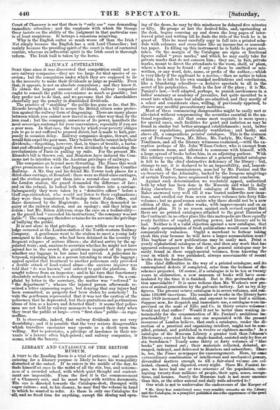RAILWAY AUSTRIANISM.
BORE time since it was discovered that competition could not co- erce railway companies—they are too large for that species of co- ercion; but the compulsion under which they are supposed to lie is the necessity to make the dividends as large as possible. Even that, it appears, is not an absolute rxunpulsion; and they know it. To obtain the largest amount of dividend, railway .companies ought to consult the public convenience as much as possible ; but they prefer not to do that, and we presume that the shareholders 'cheerfully pay the penalty in sliminished dividends. The practice of "snubbing" the public has gone so far, that Mr. Ricardo brought in a bill to seoure the British citizen some protec- tion against the railway form of dragooning. There are many places between which you camiot now travel in any other way than by the iron road ; but the company, conscious of its power, manifests the most sovereign oontempt for your convenience, especially if you are a poor man. In that case, the train.by whiehyour poverty obliges you to go is not suffered-to preiceed direct, but is made to halt, pur- ,posely to occasion delay. 14. way companies despise, thwart, and would fain expel thepoor man. They believe thathe cannothelptheir dividends,—forgetting, however, that, in times of trouble, a turbu- lent and offended poor might pull down dividends by emulating the revolutionists of Paris in pulling up rails. For the present .Mr. Rioardora bill is thrown out, and Thnieters have induced the Com- mons not to interfere with the.Austrian privileges of railways. The companies go beyond mere thwarting. The Taxies this -week gives prominence to a ease that happened on the Eastern Counties "Railway. A Mr. Gay and his friend Mr. Towne tool places for a third-class carriage, at Romford : there were no third-class carriages, and the smtion-porter put them into a second-class carriage. At the London station, the guard demanded the difference of fare ; and on the refusal, he locked both the travellers into a carriage. Subsequently they were taken by a ".detective :officer" before .a bluff superintendent, who would not listen to their explanations ; they were then 'transferred to Worship Street Policeand there dismissed by the Magistrate. In vain they demanded in- quiry at the railway station, and an a elegy; and they bring an .11.06011 :.but Mr. Baron Alderson stops the case on a technicality— as the guard had " exceeded his instructions," the company was not liable "3. The companytherefore retains for its servants the privilege .of tallying the public It is not alone in that privilege. A. case within our own know- ledge occurred at the London station of the North-western Railway ..Company. A.gentleman went to the staticn to meet a young lady aonsi,gned to his charge, who had been detained in the rountly by frequent relapses of serious illness ; she did not arrive by the ap painted train; and, anxiausto ascertain whether he might not have missed her in the crowd, the gentleman inquired of the porters whether any 1%-ga.,p in her name had waived. A. pobeeman
in- to repulsing him as a person intending to steal the luggage appeal against that treatment to another policeman only provoked a double attack of loud-voiced abuse—the Anxious inquirer was told that " he was known," and ordered to quit the platform. He nought redress from an inspector ; and in his turn that functionary absolutely refused to receive a charge against the.men. On a com- plaint by letter to the secretary, the matter was " referred" to
"eke de ent" ; whence the injured person afterwards re- ceived etter expressing regret but denying that any.injury had been committed, as property lied been stolen by somebody! In -vain the gentleman represented that it was not the caution of the policemen that he deprecated, but their gratuitous and pertinacious abuse of him as a known and detected finals it seems thatpolice-
- men ere not held by railway managers to exceed their duty when treat the public at large—even "first class" public—as raga- us.
It is observable, indeed, that railway dividends are not vex)
flourishing ; and it is possible that the very serious disagreeables Which travellers encounter may operate as a check upon tra- velling. But to potentates, a privilege of insolence in their ser- vants is a luxury often high-priced ; and railway companies, it seems, relish the etny.


























 Previous page
Previous page